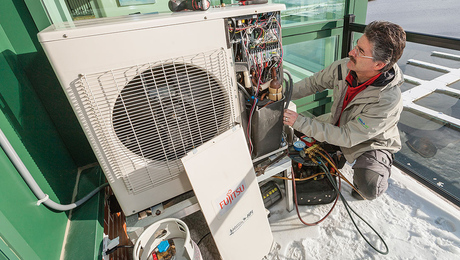Tankless vs heat pump water heaters
What are the pros and cons of tankless vs heat pump water heaters

Self-installing an HVAC system requires a lot of thought and planning.

"I have learned so much thanks to the searchable articles on the FHB website. I can confidently say that I expect to be a life-long subscriber." - M.K.
Get home building tips, offers, and expert advice in your inbox

Dig into cutting-edge approaches and decades of proven solutions with total access to our experts and tradespeople.
Start Free Trial Now
Get instant access to the latest developments in green building, research, and reports from the field.
Start Free Trial Now
Dig into cutting-edge approaches and decades of proven solutions with total access to our experts and tradespeople.
Start Free Trial NowGet instant access to the latest developments in green building, research, and reports from the field.
Start Free Trial Now© 2025 Active Interest Media. All rights reserved.
Fine Homebuilding receives a commission for items purchased through links on this site, including Amazon Associates and other affiliate advertising programs.
Get home building tips, offers, and expert advice in your inbox
Become a member and get instant access to thousands of videos, how-tos, tool reviews, and design features.
Start Your Free TrialGet complete site access to expert advice, how-to videos, Code Check, and more, plus the print magazine.
Already a member? Log in
We use cookies, pixels, script and other tracking technologies to analyze and improve our service, to improve and personalize content, and for advertising to you. We also share information about your use of our site with third-party social media, advertising and analytics partners. You can view our Privacy Policy here and our Terms of Use here.
Replies
This probably depends mostly on your fuel, gas or electric
Pros - energy efficiency; Cons - higher initial cost. Heat pump: Pros - energy efficient; Cons - higher installation complexity.
I installed a heat pump water heater this weekend. I didn't find it any harder to install than the gas water heater it replaced (which I had installed in the past). The heat pump is a little noisier, but it isn't as noisy as a small window air conditioner. I was surprised with how much it cools our the basement utility room, my wife now puts on a sweater to do the laundry. I'm curious what it will be like in the winter. The one difficulty was getting it into the basement and into place. It weighs 170 pounds. Luckily my son was able to come help me.
I assume you did your homework as to fuel costs. What made you chose a heat pump vs gas demand? Was your previous a tank heater?
Previous was a tank. I wanted to eliminate the only gas appliance going into my chimney in preparation to removing the chimney. I also received a sizeable rebate as well as the federal tax break.
I've installed a lot of gas demand heaters. (My first was a Bosch with serial number 6. Needless to say this was before they were common. It got replaced after 25 years.) I don't think I'd ever use a gas tank water heater again. I've never seen the point of electric demand water heaters except for small point of use ones. I can imagine some commercial uses where a lot of hot water was need very infrequently. The circuits need to be fairly large. Electric tank heaters are 100% efficient in converting electricity to heat, and if well insulate are pretty fuel efficient. They are also great for solar back up. But the choice would depend on any option for gas. The house where I was born had its own gas well. I don't think there are many of those any more. I don't think it is very efficient to use PV electric for resistance heat elements.
Tankless water heaters need instant power input to match demand for hot water. This means either a hefty gas service, or hefty electric service.
Electric tankless can be placed near the points of use to reduce delay for hot water, trading more electric wiring distance and cost for plumbing expense, delay each use, and waste heat left in water lines.
Heat Pump is going to be electric only. In heat pump mode, 3-4 times as efficient as resistance heat, which will remain as a back-up.
Heat pump moves heat from the surrounding air into the hot water needs. In summer it provides welcome cooling, and will dehumidify. In winter it will add to the heating load. Depending on the fuel used, (and where you live), it may or may not pay to run in heat pump mode in the winter. I think the refrigerant loop and compressor in the heat pump do better when run instead of leaving off for a long time.
I never saw a gas demand water heater that required more than a 3/4" gas line. Same as a tank heater.
storage water heaters (gas) run under 40kBTU
Instant water heaters (gas) need closer to 200kBTU.
The size of the piping required scales with distance from the meter and BTU.
If the water heater is very close to the meter, 3/4 inch line can be ok, if there is any distance it needs to be larger.
Half inch would be fine for a tank heater if close.
nice thing about a storage (tank) water heater is that there is no minimum flow rate required to get some hot water. If you need just a trickle it’s there. With tankless, unless it is a very small unit there is a minimum flow rate needed to get the unit to start.
Cost wise, if you have gas available, the gas beats electric all year round (especially if your electric company is Southern California Edison)